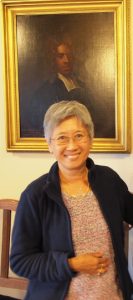 I had been looking for a Masters course in theology, by distance learning, for some time. This course covered material that interested me, in a way that allowed for in-depth study and not just a superficial overview. I wanted to deepen my understanding of God’s Word and its application to contemporary ethical and political issues.
I had been looking for a Masters course in theology, by distance learning, for some time. This course covered material that interested me, in a way that allowed for in-depth study and not just a superficial overview. I wanted to deepen my understanding of God’s Word and its application to contemporary ethical and political issues.
As an Anglican lay reader and leader of two regular Bible studies, I find that people to whom I minister are hungry for greater understanding of the Bible. In ministry, people often ask me, “What does the Bible say about XYZ?”, or “Does this verse mean that PQR practice is wrong?” I was seeking to learn rigorous approaches to hermeneutics: ways in which the Bible can be interpreted and soundly applied to contemporary social and political issues.
I appreciated the fact that there is a short attendance requirement but that most of the actual learning takes place at home, with four major essays per semester. I knew the university by reputation and believed that it would provide a worthwhile learning experience.
From participating in the course, I have had the opportunity to wrestle with a variety of social and political viewpoints. Digging deeply into a range of texts has led to much time spent in contemplation of the Scriptures, which has often led me to meditative prayer and to some very difficult but very rewarding “dialogues” with God. The in-depth essays have helped me to hone my writing skills and to express theological and ethical ideas in structured and (hopefully) convincing arguments.